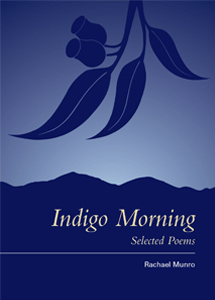Geoff Page reviews Indigo Morning: Selected Poems by Rachel Munro

Indigo Morning: Selected Poems
By Rachael Munro
ISBN: 9780987129130
Reviewed by GEOFF PAGE
Rachael Munro’s second book, Indigo Morning: Selected Poems, is intriguing on at least two levels, the autobiographical and the aesthetic. Her first book, Dragonshadow, was published in 1989. Although this new collection is highly personal in many ways it offers no definitive clues as to what’s happened to the poet in the intervening 24 years. In poems such as “Proof of a Day” and “Profiteroles” there is a hint that alcohol may have had a role but it would seem to have been a more complex and elusive story than that word alone might suggest.
The collection is divided into five parts of which the first two graphically evoke a classically happy Australian rural childhood, near the Hawkesbury River and on the Monaro. Munro’s empathy with animals is evident throughout and she clearly understands that horses (and cats) vary as much in their personalities as humans do.
This talent is felt particularly in poems such as “Wanting” and “The Old Bay Mare” where, in the latter, the poet remembers:
She wouldn’t be caught.
She’d defy, elude me.
In the hundred-acre paddock
we’d have to herd her
from the four-wheel-drive
and even in the yard,
bribe with lumps of sugar. (p.44)
The language here is simple, perhaps overly so, but true also to the experiences described. One sees comparable risks taken at the end of “The Last Summer” where Munro recalls “Climbing out of my own window / after midnight / just to watch the stars.” (p.29) There are times when simple, honest statements like this can seem naive but there are also times when they are the most powerful strategy available. This is one of those occasions i.e. when elemental language does justice to the comparably elemental experience of “watch(ing) the stars”.
The same emphasis on literal description is seen throughout the section, “Cat, My Child” — which, as a whole, with its scrupulously close visual attention and thoughtful speculation, is almost an up-date of Christopher Smart’s famous poem, “For I will consider my Cat Jeffrey”. A nice sense of the section’s mood as a whole, along with some extra metaphoric energy in the middle, can be felt in the second stanza of “The Faint Fragrance of Clean Damp Cat”:
The grey kitten is upstairs
performing his toilette
in the hills and hollows of my unmade bed.
Soon the crumpled sheets will wear
the faint fragrance of clean damp cat.” (p.59)
In the book’s last two sections, Munro moves away from animals and childhood into more problematic areas. They include passing references to alcoholism already mentioned — and a sense, at times, of intense loneliness. The latter is evinced strongly in “From a Suburban Window” (“I sit in my niche by the open window / and listen to the aura of silence — / heater whirring, occasional bird calls, / palms fronds restless in the slight air”) (p.77). The poet’s (or the speaker’s) rather desperate efforts to counter such loneliness with a Christmas party are convincingly evoked in the prose poem, “Profiteroles”, — which concludes:
I’m feeling mild pangs of enthusiasm and it’s so disconcerting and slightly painful to change a mind set. I wonder if two Panadol would help?” (p.73)
Even more forceful, in a different way, are two “set piece” poems at the end of the book, “The Newborn of Ashkelon” and “Love and Despair”. The first is a complex meditation on the recently-discovered bones of baby skeletons (95 % of them male) found in a third century AD Roman sewer under a bath-house/brothel in what is now Israel.
Like “Love and Despair”, a sinister poem about AIDS transmission which follows it, “The Newborn of Ashkelon” is a graphic consideration of issues such as prostitution and infanticide which persist through time and across cultures.
Girls could grow up
in the bath-house and become the next
generations of prostitutes, an investment
by the mother, an insurance against aging. (p.86)
These two pieces make a strong climax to the book — and some readers, including this one, may well wish there had been more of them along the way. They tend to make the poems about cats, horses and childhood, evocative though they are, seem a lead-up to something more powerful and less personal. Perhaps Munro’s third collection will feature more poems which confront such inherently dramatic material — though it’s hardly the reader’s (or reviewer’s) role to be so prescriptive.
GEOFF PAGE is a Canberra-based poet and critic. He has published twenty-one collections of poetry as well as two novels and five verse novels. His awards include the Grace Leven Prize and the Patrick White Literary Award, among others.